L-lysine, or lysine for short, is an amino acid supplement. It may be used in cats for immune support with the intent of curbing or suppressing the effects of the feline herpes virus (FHV). In this article, you’ll learn what lysine is, how it may help cats, potential side effects, and some frequently asked questions.
Quick Overview: L-lysine For Cats

About L-lysine For Cats
Cats that lead stressful lives, such as cats living in rescue shelters, are more susceptible to FHV.
Lysine is an amino acid. Amino acids are the most basic components of proteins and are needed for many processes within the body. These processes include the creation of new proteins, hormones, and neurotransmitters. There are a total of 20 amino acids, with some being essential and others considered non-essential.
Lysine is considered one of the essential amino acids, along with tryptophan, methionine, and a few others. Examples of some non-essential amino acids include alanine, glutamine, and arginine.
One way that Lysine is proposed to work to help cats is that it competes with arginine in its role with herpes viruses. Arginine is believed to be required for producing infective viral particles that allow a herpes virus to infect a host. When lysine is incorporated into the virus and outcompetes arginine, the virus is then thought to become less infective.
However, some research has refuted this method, showing that virus replication was not affected by low arginine levels. Lysine supplementation was also found to not lower arginine levels in several studies.
In humans, lysine has been found to have some positive effect on stress and anxiety.
What Does L-lysine Do For Cats?
Very young kittens are often more susceptible to FHV.
Feline herpesvirus (FHV) and specifically feline herpesvirus-1 (FHV-1) is an extremely common virus that infects cats. It is especially common in very young kittens, cats with poor immune systems, and cats under a lot of stress, such as those in a colony or shelter environment.
Feline herpesvirus can cause conjunctivitis (eye inflammation) as well as upper respiratory signs of sneezing and nasal congestion in cats. A large majority of cats presenting with signs of sneezing and eye discharge have underlying herpesvirus infection.
The problem with herpesvirus is that while symptoms may come and go, it can never truly be removed from the body. Cats that have herpesvirus may continue to have flare-ups of conjunctivitis and sneezing throughout their lives. Flare-ups occur more often during times of stress, like during a move to a new home or the introduction of a new baby or pet that changes their familiar routine.
Feline herpesvirus can also predispose cats to secondary bacterial infections that can lead to worse signs like fever, heavy nasal congestion and inability to smell, bacterial conjunctivitis, lethargy, and poor appetite.
While improvements have certainly come along in the last 20 years, antiviral drugs generally have been more challenging to develop. This is because there are fewer parts of a virus for a drug to target than there are for bacteria. In addition, antivirals available, unlike most antibiotics, cannot cure a viral infection. Instead, these conditions require life-long therapy.
These challenges led to an interest in L-lysine’s potential to reduce the effects of herpesvirus symptoms through the administration of what is essentially a nutritional supplement that has very few perceived side effects.
Despite its promise, L-lysine has a varying record in research studies.
The use of lysine has been shown to suppress the shedding of the virus and to reduce the severity of conjunctivitis in experimental conditions.
However, at least in shelter cats, it has not been shown to significantly improve or prevent upper respiratory tract infections. Shelter cats are predisposed to a lot of stressors and potential infectious organisms, which can complicate treatment monitoring and outcomes.
In 2015, two virologists, Sebastiaan Bol and Evelien M. Bunnik conducted a review of studies on lysine supplementation in cats and in humans in regards to herpesviruses. They concluded that the studies they reviewed did not show any benefit to lysine supplementation in cats with herpesvirus. In one of the studies, viral shedding was actually increased in a group of shelter cats.
Shortly after the study was released, an article in Veterinary Practice News analyzed the findings in light of arguments for and against use of lysine in cats.
In it, Dr. David Maggs, a clinical veterinary ophthalmologist whose research on FHV was included in the Bol/Bunnik study responded to the conclusions:
“I was surprised by the conclusion,” Maggs said…“To say that there was no evidence strikes me as a little bit odd because they point out in their own manuscript that there has been at least one study that suggested a benefit.”
“[I] recommend perhaps a moderation of the final conclusion because I don’t think we can say that this drug should be stopped in all cats with herpesvirus,” Maggs said. “I think they’ve introduced a useful cautionary note of whether it should be initiated in every cat, but recommending an immediate cessation is probably a stronger conclusion that I would have drawn from the same data.”
“I have clients who tell me that every time they take the cat off lysine the problem returns,” he (Dr. Maggs) said. “Now that’s totally anecdotal evidence, but … I’m using it as an example that we should not recommend a blanket immediate cessation of therapy in all cats.
Another veterinarian, Dr. Gary Norsworthy is quoted in the article with a similar perspective to Dr. Maggs:
“[Lysine] is used frequently by many of my clients…” Dr. Norsworthy said. “Some cats have a very convincing response in spite of what the science says.
“I do not recommend it as a first-line treatment for feline herpesvirus-1,” he said, “but I also do not discourage it. Cats are not very conversant with the (research) literature. Its use should be based on response, whether scientific or not.”
Both veterinarians state the importance of anecdotal evidence for continued use of lysine in some cats. Anecdotal evidence is that which is collected by personal observation, such as by a doctor seeing the result of a treatment in a particular patient.
This perspective on anecdotal evidence is questioned by Dr. Bol in the article: “…Anecdotal evidence is no evidence. … Anecdotal evidence is a contradiction in terms.”
While formal research appears to not support lysine use in cats, veterinarians who have used it for many years may still recommend it based on improvements they’ve seen with their own patients.
These recommendations may be more common for use in household cats with a chronic history of herpes virus. Administering it to cats in the comfort of their own home may be less stressful and there may be fewer stressors complicating their health.
Side Effects Of L-lysine For Cats
Fortunately, side effects of L-lysine are rare. Adverse effects have not been observed in clinical trials. Overdose toxicity is also considered unlikely. However, gastrointestinal effects like decreased appetite, vomiting, and diarrhea can occur if a cat ingests a large amount of lysine.
L-lysine Dose For Cats
Cats may take L-lysine as a snack or treat, and it’s recommended that they consume it in one sitting.
There are many products containing L-lysine with the intention of being used as a supplement for cats. While many products may be labeled for use in cats and kittens, it is important to note that no products are FDA approved for treating or curing cats of herpesvirus, and all doses are considered extra-label.
- L-lysine gel (Viralys is a common brand but there are many generics) comes in 250mg per 1.25ml.
- L-lysine powder (Viralys, again, is a common brand with generics available) comes in 250mg per rounded scoop.
- L-lysine chews under the brand Optixcare have 500mg per soft chew treat.
The recommended off-label dosage for L-lysine in cats using one of these types of products is 205mg for a kitten or up to 500mg for an adult cat. Doses can be given once or twice a day.
Generally, it is recommended that a cat consume the entire dose in one sitting. For example, a kitty should consume all of the gel or chew it as a treat. If the powder is used and mixed with food, it should be eaten all at once and not snacked on throughout the day.
Administration of L-lysine should be a pleasant experience for your cat. The stress caused by forced administration is thought to possibly counteract any potential benefits.
Conclusion
House cats that take L-lysine in the comfort of their own home are less susceptible to stress and gain the most benefits from it.
L-lysine may be recommended for use in cats suffering from chronic herpesvirus infection. While evidence for use to treat or prevent upper respiratory symptoms is variable, some vets continue to recommend it based on benefits they see in their patients. It may demonstrate the most success in house cats who live in a cared-for and less stressful environment. Its lack of significant side effects and perception as a nutritional supplement have made it a favorable option to help with the chronic herpesvirus.
Drug Dosing Disclaimer: We are only able to provide doses for medications that are FDA approved for use in cats and only as the label guidelines dictate. For medications that are used off-label we can only provide guidelines and safety information for use. Safe and appropriate dosing for off-label medications can only be determined by a primary care veterinarian.
We encourage you to work with your veterinarian to determine if a particular medication is appropriate for your cat. Changing or adjusting a dose for your cat on your own without consulting with a veterinarian can carry risk. We do not encourage use of medications prescribed for human use in pets without first consulting with a primary care veterinarian.
Frequently Asked Questions
How much L-lysine should I give my cat?
The general recommendation for L-lysine supplementation for cats is up to 250mg for kittens or up to 500mg for adult cats, given once or twice a day. For most products available, this equates to about 1ml of gel, one chew, or a single scoop of powder.
Can I give my cat L-lysine everyvday?
Yes. In fact, if you are using L-lysine as a supplement to help with herpesvirus symptoms, then it should be given every day. While L-lysine can be given during flare-ups as well, it likely has more preventive action for cats that show chronic signs of herpesvirus, if used consistently.
Can you give cats L-lysine?
Yes, but make sure to use a product intended or labeled for use in cats. Human supplements also exist, and should be avoided for use in cats. The forms intended for cats are less stressful to administer (in chew treat, tasty gel form, or as a flavored powder that can be mixed with food). Stress associated with the administration of L-lysine in cats may negate its potential benefits.
Does Lysine for cats have side effects?
While digestive upset is possible with very high doses, significant side effects have not been routinely observed in cats receiving L-lysine at recommended, labeled doses.
How long does it take lysine to work in cats?
The length of time for the effect of lysine to be seen can vary and may depend on the severity of the upper respiratory signs present, as well as how stressful the environment is. Any more severe upper respiratory infections or those complicated with bacterial infections will be less responsive.
Lysine may also be less effective in cats with pre-existing anxiety or fear-related behavioral disorders or in multiple-cat environments.
Generally, it will at least take several doses of lysine to expect improvement. Full effects of lysine supplementation may take up to several weeks but gradual improvement should be seen during that time.
Anecdotally, in cats who have been supplemented with lysine long-term but have it discontinued with a subsequent return of URI signs, owners have reported seeing benefits within 1-2 weeks of restarting lysine supplementation.
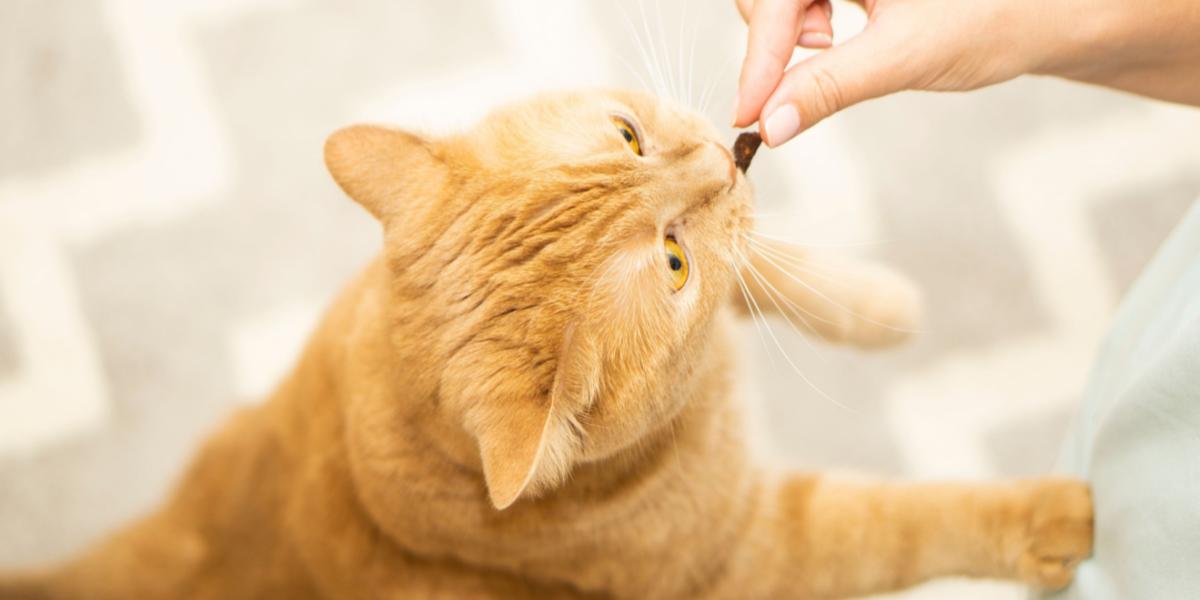
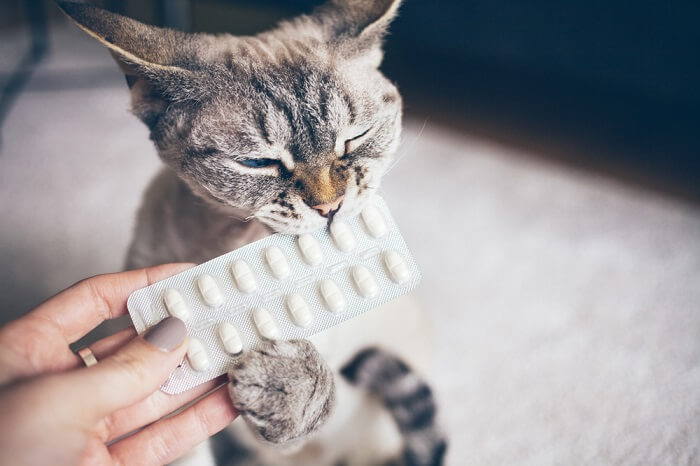
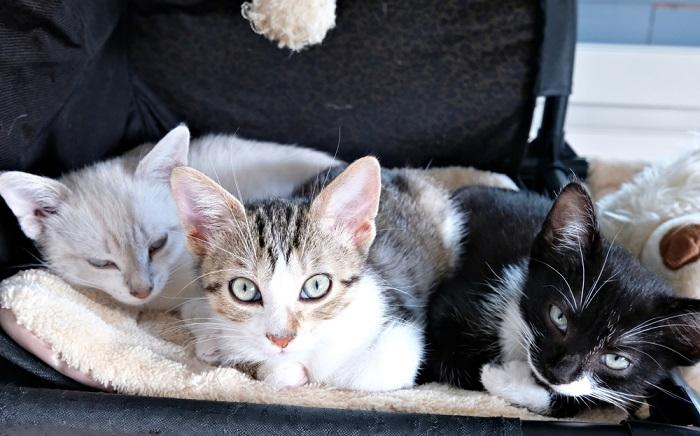
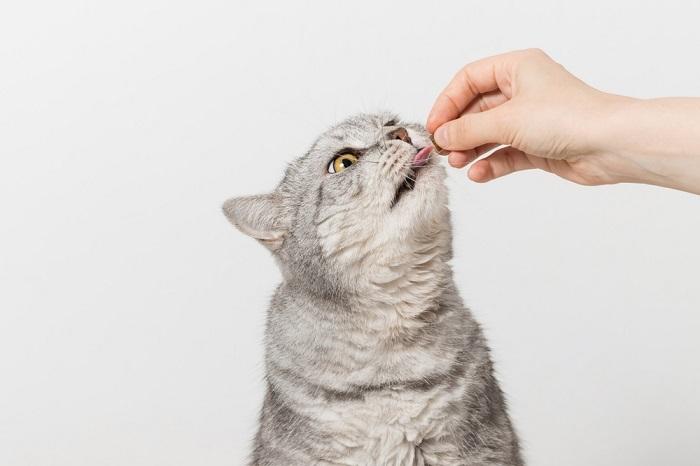
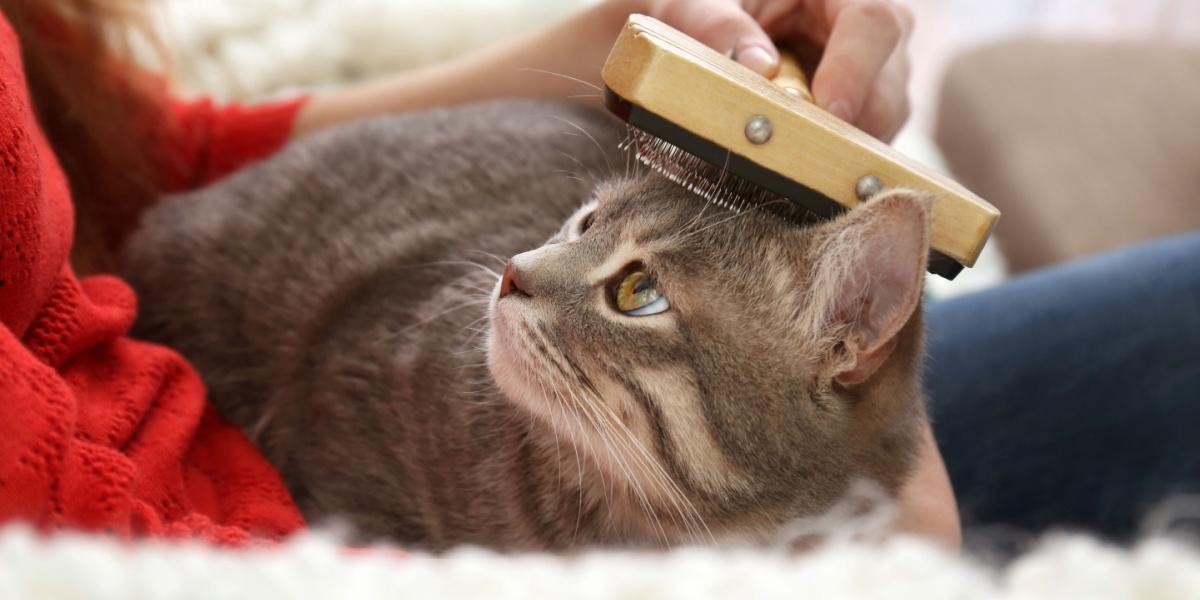




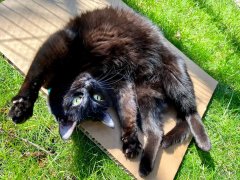
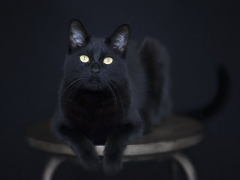
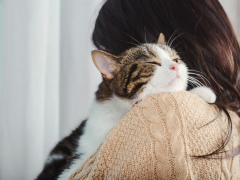

I love this site. I wish I would have found this article months ago when my senior girl first started exhibiting symptoms. She’s indoor only but…it is what it is. She’s now on l-lysine. Keeping my fingers crossed. Thank you for cats.com.
Thanks for your kind words, Yvonne, we do our best! Good luck to you and your kitty.
So glad I found this site! Thank you Dr. Vanderhoof !
Thanks Lauren! I hope you find lots of great information, tips, and advice for you and your kitty.
I don’t understand why Veterinarians continue to prescribe/advise things without even checking to see if new studies and info have been done on a product. Instead they continue to tell owners their cat needs this or that when it is actually harmful fo a pet. L-LYSINE does not have any antiviral properties, but was once believed to act by lowering arginine levels.
However, lysine does not antagonize arginine in cats, and evidence that low intracellular arginine concentrations would inhibit viral replication is lacking. Furthermore, lowering arginine levels is highly undesirable since cats cannot synthesize this amino acid themselves.
Arginine deficiency will result in hyperammonemia, which may be FATAL especially in kittens and senior cats. In vitro studies with feline herpes virus 1, showed that lysine has no effect on the replication kinetics of the virus.
Finally, and most importantly, several clinical studies with cats have shown that lysine is NOT effective for the prevention or the treatment of feline herpes virus 1 infection, and some even reported increased infection frequency and disease severity in cats receiving lysine supplementation. An active feline herpes “breakout” usually only lasts as long as our common cold. So people are thinking the cats symptoms started improving because of the Lysine, when the symptoms actually were Improving on their own! There have been cases of cats dying from this.. It’s horrible that it is still be recommended and evil so many companies are selling this for cats under the false pretense that Lysine boosts immunity and reduces symptoms when it actually doesn’t and can be harmful.
Please see my full comments following your next post after Duncan’s.
Double the dose .. yeah I did the 500 MG on some of my cats … what I found with my idiopathic disease and treating cat .. most of the time NOT always but most of the time the MG dose recommended is low . IF I get a cat sneezing and clear mucus .. 500 MG twice a day .
https://pubmed.ncbi.nlm.nih.gov/26573523/
RESULTS: There is evidence at multiple levels that lysine supplementation is NOT EFFECTIVE for the prevention or treatment of feline herpes virus 1 infection in cats.
IMMUNITY:
L-LYSINE does not have any antiviral properties, but was once believed to act by lowering arginine levels.
However, lysine does not antagonize arginine in cats, and evidence that low intracellular arginine concentrations would inhibit viral replication is lacking. Furthermore, lowering arginine levels is highly undesirable since cats cannot synthesize this amino acid themselves.
Arginine deficiency will result in hyperammonemia, which may be FATAL especially in kittens and senior cats. In vitro studies with feline herpes virus 1, showed that lysine has no effect on the replication kinetics of the virus.
Finally, and most importantly, several clinical studies with cats have shown that lysine is not effective for the prevention or the treatment of feline herpes virus 1 infection, and some even reported increased infection frequency and disease severity in cats receiving lysine supplementation.
Conclusion: We recommend an immediate stop of lysine supplementation because of the complete lack of any scientific evidence for its efficacy and has shown to be fatal in some cats!
Thank you for your comment and concern.
The study you mention, for others not familiar, is what is called a literature review. Bol and Bunnik did not perform their own study, but reviewed past studies others had performed, to look for patterns in order to draw an overall conclusion.
It is true that the authors determined there was poor evidence to support lysine use in cats for herpesvirus based on the 7 or so studies they evaluated.
But as far as concerns about lysine, there are three important things to clarify in their study.
Their study delves into the whole concept of lysine antagonizing arginine and thereby reducing viral shedding. This was, as you stated, a proposed way that lysine is supposed to work. I mention this in the article simply because no other mechanism has been proposed.
However, multiple times, the authors of this study stated evidence to debunk the lysine-arginine antagonism method. FHV shedding did not appear to be affected by lower arginine levels in vitro.
In studies they reviewed, lysine supplementation also had no effect on arginine levels in cats and the authors concluded that this antagonism of the two amino acids is likely not something that happens in cats.
The authors separately delved into how detrimental lowering arginine levels in a cat would be. I think their intention was to deter any further studies from trying to actively lower arginine levels in cats as a therapy approach, as this would be harmful.
But what wasn’t really connected together more clearly, although they stated these things separately, is that while decreased arginine levels would be detrimental to a cat, lysine supplementation was never seen in any of the studies they reviewed to actually lower arginine levels.
Clinically in practice, severe ill effects from lysine supplementation along the lines of increased ammonia levels and death have not been appreciated or reported to my knowledge (and the study conclusion did NOT include comments on lysine being fatal in cats). Lysine has been used in cats for close to 20 years. While efficacy can certainly be hit or miss, it has not ever been perceived as something that can cause such severe harm.
So that leads to the question of why veterinarians may still recommend lysine use for cats. The simple answer is anecdotal evidence of benefit.
Anecdotal evidence refers to evidence of what outcomes doctors see with therapies in individual patients. Researchers who do not have clinical experience in a medical setting dislike anecdotal evidence because it cannot be repeated in a large study population and can’t be tested with a control group.
While doctors do base therapy approaches on research, they have to rely on anecdotal evidence a lot too because our approaches to treatment are always individualized.
There was an article published shortly after Bol and Bunnik’s study that provides a good balance of perspectives on lysine use which would be helpful for anyone with concerns about this study to read.
In it, Dr. David Maggs, a clinical ophthalmologist whose research on FHV was included in the Bol/Bunnik study responded to the conclusions of the study with a different perspective:
“I was surprised by the conclusion,” Maggs said. “The conclusion seems to be, at least for science, very boldly stated. Scientists are well known for not really stating things very boldly, and that’s one of the criticisms we get.
“To say that there was no evidence strikes me as a little bit odd because they point out in their own manuscript that there has been at least one study that suggested a benefit.”
“[I] recommend perhaps a moderation of the final conclusion because I don’t think we can say that this drug should be stopped in all cats with herpesvirus,” Maggs said. “I think they’ve introduced a useful cautionary note of whether it should be initiated in every cat, but recommending an immediate cessation is probably a stronger conclusion that I would have drawn from the same data.”
“I have clients who tell me that every time they take the cat off lysine the problem returns,” he (Dr. Maggs) said. “Now that’s totally anecdotal evidence, but … I’m using it as an example that we should not recommend a blanket immediate cessation of therapy in all cats.
“There are clearly some cats who respond well in a disease that sometimes has very subtle signs,” he added. “Maybe it’s just as well to leave those cats on lysine if the clients genuinely feel that it’s making a difference.”
Another veterinarian, Dr. Gary Norsworthy is quoted in the article with a similar perspective:
“[Lysine] is used frequently by many of my clients at the recommendation of Dr. Google,” Dr. Norsworthy said. “Some cats have a very convincing response in spite of what the science says.
“I do not recommend it as a first-line treatment for feline herpesvirus-1,” he said, “but I also do not discourage it. Cats are not very conversant with the (research) literature. Its use should be based on response, whether scientific or not.”
This perspective on anecdotal evidence is ridiculed by Dr. Bol, who as a virology researcher, doesn’t consider it evidence at all:
“…Anecdotal evidence is no evidence. … Anecdotal evidence is a contradiction in terms.”
So really, this comes down to a very big difference in opinion. Most doctors, human or animal, consider research to be important, but it doesn’t dictate what we’ll see in our own patients.
In the article, I indicate that lysine’s use appears to be better suited to those cats with chronic recurrence but otherwise living a good life at home. Many pet owners do appear to see an improvement in symptoms and recurrence.
It’s unclear by what mechanism lysine may be helping in those cats that show benefit. It has also been proposed that lysine may mediate stress and anxiety and since stress can induce FHV flare-ups, perhaps that is one method.
Not fully knowing a mechanism of action for a supplement or medication that appears to help an illness or condition is very common for many medications and supplements.
The decision to use something like lysine is always going to be individualized between a doctor and patient to see if there is a positive response or not and ensure there are no adverse effects.
15 years ago I brought in 2 6 month old kittens from the outside. I couldn’t pick them up at that point, they both ina few days had nasty eye discharge. I brought them to a vet in a have a heart trap, the vet was afraid to handle them prescribed nothing & said they had a cold. I had zero cat experience at time so i went on ask.com i believe. A vet helped me online & said to give them lysine. I used stinky food like tuna or liverwurst. the only time in their lives did they ever get that again. I saw feral kittens with eye infections recently, lysine in cat food cleared up their infection! Now I have an 13 year old cat, with several inoperable tumors, skinny, i noticed his left eye is infected, he has very poor appetite, only wway i can figure to get the ground up lysine into him is mixing it with cat mil & squirting it in his mouth with a syringe. its only 2nd day & i was giving him a very small dose , i will try a 500 mg dose
……………………….
Hi Dot, thank you for sharing your experience and success with using lysine for your cats. It would be a good idea to have your cat’s eye examined by your vet, especially if it might have a bacterial infection or ulceration on the cornea. Supplementing with lysine never hurts though.
When I adopted my cat, who is FIV+, I did a lot of reading about how L-lysine could support his immune system. It seemed there was no real evidence to either confirm or deny this idea, and no evidence that it would cause my cat any harm. I figured I would give it a try; if it did help keep him healthy, great! If it didn’t, no big loss since it was not harmful and didn’t impact my wallet much. (And my vet agreed.)
I supplemented his meals as directed by the bottle of powdered L-lysine I purchased: 1/8 teaspoon twice per day. We’ve never had any issues or any indication this was problematic and I’ve continued this practice for years now. While opening a new bottle of L-lysine powder this morning, I was shocked to see the directions recommended 1/8 teaspoon twice WEEKLY! I panicked and immediately jumped on my phone to try and figure out what on earth happened. Surely I hadn’t been making such a grievous error all this time?! And of course I had not – but the powder I purchase apparently had a change in recommendations in late 2021. Here I am, finding out about it in what is almost 2024! I’m extremely disappointed such a huge change was not highlighted for consumers of this product. I’m worried about my boy. 🙁
The vendor I buy this supplement from states that the manufacturer changed their label due to two clinical trials that suggested dietary lysine in cats could enhance the replication of FHV-1.
I will be calling my vet as soon as the office opens for the day to get their opinion but I am also wondering your thoughts on this, Dr. Vanderhoof, as my use case is specifically for immune support in a cat who is FIV positive. I would appreciate any thoughts you have on the matter, but I do specifically wish to know:
• Should I reduce his dose from 1/8 teaspoon twice daily to 1/8 teaspoon twice weekly as recommend by the manufacturer?
• Is it likely I have caused any harm or damage by continuing to administer the more frequent dose?
• Are there any tests I should request from my vet?
• Any signs or symptoms I should be on the lookout for?
He has been in fine health all this time but I know it’s possible there could be as yet unseen internal damage if I have been giving him too much of this powder.
Hi Amanda,
First, I do not look at lysine as a general immune-boosting supplement. It has more been used to try to help some cats that chronically have feline herpesvirus flare ups specifically.
But to that end, there is a lot of debate about lysine’s use. Many veterinarians still advise use of lysine because they see benefits on a case by case basis in their practices. In the article, I attempted to highlight both sides of the argument.
But I think you’d encounter very few vets who feel that lysine actually causes any kind of harm. It has not shown to have any kind of toxic effects on the body. One study that I mention in the article did show more cats shedding feline herpesvirus while on lysine, but since they were shelter cats under a variety of stressors, it’s hard to say the lysine was directly responsible. Bol and Bunnik simply used this study to support their view that lysine was ineffective.
I am not surprised that some supplement manufacturers may have changed their guidelines in the wake of the Bol and Bunnik study. If they’ve made these changes, they were likely voluntary out of an abundance of caution and have nothing to do with any significant safety concerns with lysine (like you might have with, say, a drug/medication recall or something like that).
In answer to your specific questions:
1) Because supplement manufacturers all formulate their products differently, you may want to follow their guidelines for their specific products.
2)I highly doubt you have caused any harm to your kitty using lysine. If you have noted no ill effects the last couple of years, especially.
3)Lysine supplements are not a drug or medication where some kind of organ function monitoring is needed. There are no parameters on bloodwork that have ever been documented to be needed to check while a cat is taking lysine.
4)If your cat has FIV, you should always be vigilant for any developing signs of illness. I would not expect anything unique to look for from being on lysine.
My now 11 month old Kitty was born with Entropion. The vet did the surgery, he was given erythromycin ophthalmic ointment and probiotic (powder) Months later the infection had not improved. by now, the leakage was pink, bloody. Took him to a different Vet, diagnosed with conjunctivitis. Given same treatment, ointment and this time L-Lysine. His looked good for a few days. But the infection has returned with vengeance. Oozing (pink) blood and a bit swollen. I’m at my wits end and worried for my kitty! Please help
Sorry to hear about your kitty, Tracey! I’m forwarding your comment to our veterinary panel to see if someone can answer your question.
Hi Tracey,
I’m sorry to hear about the hard time you’re having with your kitty. Your situation does not sound like a routine problem and it’s concerning if you’re seeing a blood tinge to the eye discharge, especially if it’s been ongoing for months. I can’t give you specific details from your description. I wasn’t sure if this is only involving one eye, both, or if complications occurred after surgery. It’s not clear to me if this is really some kind of resistant infection or some kind of physical issue with tissue structures around the eye(s). But given your struggles, I would highly suggest seeing a veterinary ophthalmologist for a second opinion. If you’re continuing to have struggles with the current treatment plan, your vet should be open to referral and would be able to provide you with some local options. While I doubt it’s causing any harm and is a well-intentioned therapy, I don’t think Lysine alone is going to be the ticket here. It seems you still don’t have a true diagnosis for the ongoing issue and I think a veterinary ophthalmologist would be able to assist with that.
Would L-lysine help for a cat with Calicivirus? Thank you <3
Hi Emma,
There is no formal research to my knowledge for using L-lysine specifically for calicivirus. In fact, one of the studies I refer to in the article that looked at lysine’s effect in shelter cats suggested that one reason it may not have been effective is that other causative agents of upper respiratory signs, like calicivirus and bordetella, may have been involved. This would tell me that one of the lead researchers looking into L-lysine did not think of it as being helpful for calici. While the mechanism of action of competing with arginine in herpesvirus is debated or has lost favor, I think that theory was only for herpesvirus as well.